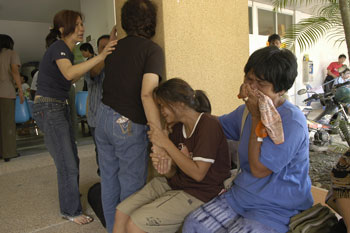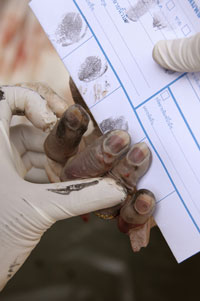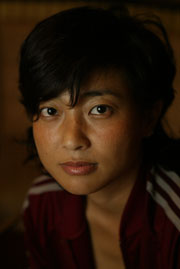Jessie De Witt, a photo editor at the New York Times, called me at 6 o'clock on Monday morning, two days after Christmas. "Jean, there has been a big earthquake in Southeast Asia. Can you go to Phuket, Thailand?" Frankly, I did not know what she meant. Half asleep, I asked, "Are you sure about this?"
 |
Photo by Jean Chung for the New York Times/World Picture News |
Although the disaster had happened Sunday morning, it was not big news in South Korea for some reason. Still not entirely awake and unaware of magnitude of the disaster, I got up and checked the news. I discovered not only that Jessie was right, but also that the quake was the biggest in 40 years in Asia. I could not waste any more time: I called back New York and said, "I've gotta get down to the airport now."
It took me a full day to finally reach Phuket from Seoul. Arriving around 10:30 p.m., I got in touch with the writer and went straight to a hospital where two Americans and two Swedish shared a room. I made pictures and filed them to New York the first night. At the time, I didn't feel the enormity of the crisis.
 |
Photo by Jean Chung for the New York Times/World Picture News |
Everything became clear the second day, Dec. 28. Of the several beaches affected, and I decided to go to Patong Beach. But first I went to the Patong Hospital thinking there could be a morgue. Upon arriving at the morgue, I saw a couple of military personnel carrying a dead body in a plastic bag out of the truck, then laying it on the ground. After taking a couple of shots, I looked up, scanned the area around and just could not believe my eyes. I have never seen anything like this before. Although I had seen many dead bodies in Palestinian territories, there was nothing in my experience that compared. These were stiff, decomposed, bloated, and barely recognizable. Relatives were mourning. Other people were watching the forensics while more and more bodies were brought in. The odor of decaying bodies saturated the area. I took out my mask and covered my face, but after a while, there was a point where I could not continue. A few meters away, Thai workers were making wooden coffins.
Disaster is one thing, but the aftermath is an event that strikes people mentally. When I saw those victims' bodies, I thought about their ordeal they had to go through during the disaster. While it is my job to deliver the new by the medium of photography, it was a sad moment of humanity and greatly affected me. That mother nature can easily destroy a whole family, that natural disaster can happen to anybody. I truly pay my deepest condolence to those who lost their loved ones and those who lost their lives.
Jean Chung is a native of Seoul, South Korea. A former painter, Chung later decided to become a photographer. Freelancing for a year, her work has been featured the New York Times, TIME, TIME Asia, Los Angeles Times, Le Monde, Le Figaro, and Asian Wall Street Journal. She is represented by World Picture News and Asiaworksphotos.
Donate to UNICEF's Tsunami Relief effort »





